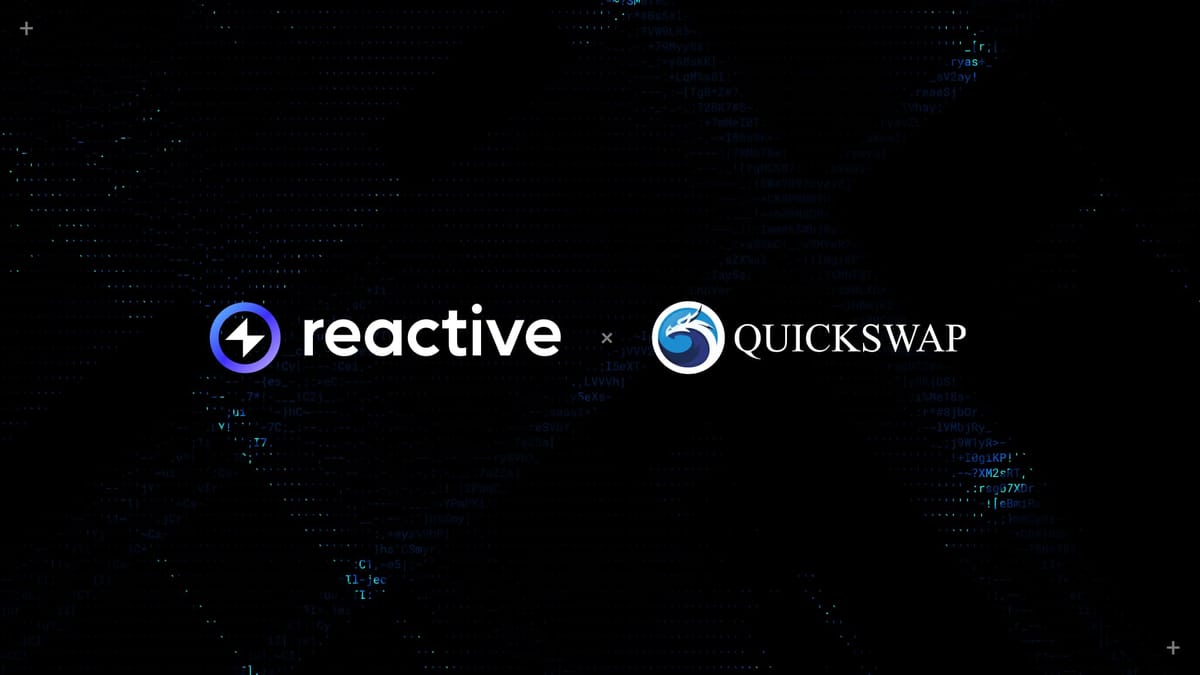Reactive Network and QuickSwap Collaboration: Automating Liquidity Pools for Maximum Efficiency
Reactive Network’s collaboration with QuickSwap automates liquidity pool workflows through Reactive Smart Contracts (RSCs), streamlining fee conversion, cross-chain bridging, and QUICK token allocation without manual intervention.

We are excited to announce that Reactive Network has entered into a groundbreaking collaboration with QuickSwap, Polygon’s leading decentralized exchange (DEX), to revolutionize the management of liquidity pool workflows. Through this partnership, Reactive Network will integrate its innovative Reactive Smart Contracts (RSCs) into QuickSwap’s operations, automating complex, cross-chain processes that previously required manual intervention.
The Challenge Faced by QuickSwap
QuickSwap manages a wide range of liquidity pools across multiple blockchains, each generating fees in a variety of tokens. Currently, the QuickSwap team manually manages and converts these fees into QUICK tokens for staking rewards, a process that is both time-consuming and operationally intensive. The complexity of handling cross-chain liquidity pools manually has been a bottleneck for QuickSwap’s overall productivity. This collaboration with Reactive Network aims to eliminate manual intervention by integrating automated workflows via Reactive Smart Contracts.
How Reactive Smart Contracts Are Transforming Operations
At the core of this collaboration are Reactive Smart Contracts (RSCs), a powerful tool developed by Reactive Network to enable fully automated, cross-chain workflows. RSCs are designed to react to on-chain events in real-time without the need for off-chain intervention. Here's how they will be implemented in the QuickSwap ecosystem:
- Automated Fee Collection and Conversion: With Reactive Smart Contracts, fees from QuickSwap's liquidity pools, which are often in different tokens, can be automatically converted into USDC. This eliminates the manual process of handling multiple tokens and consolidates fees into a standardized currency.
- Cross-Chain Bridging: After fee collection, the next challenge is bridging assets across different blockchains where QuickSwap operates. Reactive Smart Contracts will automate this process, transferring USDC between chains without manual input, ensuring real-time synchronization of assets across QuickSwap's diverse blockchain infrastructure.
- QUICK Token Conversion and Allocation: Once USDC is bridged to the appropriate chain, RSCs will automatically convert USDC into QUICK tokens, which are essential for staking rewards and liquidity incentives. The contracts will handle not only the conversion but also the distribution of these tokens into staking pools, burns, and other necessary allocations.
Technical Insight into Reactive Smart Contracts
Reactive Smart Contracts operate on the Inversion of Control (IoC) principle, where instead of waiting for user commands, the contracts autonomously respond to events and trigger actions based on pre-defined conditions. In this collaboration, RSCs will be triggered by specific blockchain events, such as the collection of liquidity pool fees or the completion of a cross-chain bridge transaction. Once triggered, the RSCs execute a series of steps—asset conversion, bridging, and staking reward distribution—without any manual oversight.
By operating entirely on-chain, RSCs enhance both the security and transparency of the processes. Moreover, RSCs minimize latency and reduce the potential for human error, offering a scalable solution for handling vast amounts of transactions in real-time.
Impact of the Collaboration
The integration of Reactive Smart Contracts into QuickSwap’s operations represents a leap forward in how decentralized exchanges handle complex, cross-chain processes. By automating liquidity pool workflows, QuickSwap can now focus on developing new features, improving the user experience, and scaling its operations without the burden of manually managing fee collections and asset conversions.
Daniil Romazanov, Reactive Network’s Chief Technology Officer, emphasized the importance of this integration, stating, “We’re redefining what’s possible in DeFi. Reactive Smart Contracts will streamline workflows across multiple chains, offering QuickSwap the autonomy and efficiency that DeFi platforms need to scale.”
On the other side, Alexi Atlas, QuickSwap’s Head of Business Development, pointed out how the automation will free up resources for innovation. "Automating liquidity pool workflows with Reactive Smart Contracts will significantly reduce manual tasks, allowing QuickSwap to focus on enhancing the trading experience for users."
Looking Ahead: The Future of DeFi Automation
As DeFi ecosystems expand across multiple chains, the need for efficient, automated processes becomes critical. This collaboration between Reactive Network and QuickSwap highlights how decentralized technology can enhance operational efficiency without sacrificing transparency or security. The partnership is a significant step towards a fully automated DeFi space, where complex processes like liquidity management are streamlined through advanced blockchain technologies like Reactive Smart Contracts.
For more information on how Reactive Smart Contracts work, visit Reactive Network and QuickSwap.
About Reactive Network
The Reactive Network, pioneered by PARSIQ, ushers in a new wave of blockchain innovation through its Reactive Smart Contracts (RSCs). These advanced contracts can autonomously execute based on specific on-chain events, eliminating the need for off-chain computation and heralding a seamless cross-chain ecosystem vital for Web3’s growth.
Central to this breakthrough is the Inversion of Control (IoC) framework, which redefines smart contracts and decentralized applications (DApps) by imbuing them with unparalleled autonomy, efficiency, and interactivity. By marrying RSCs with IoC, Reactive Network is setting the stage for a transformative blockchain era, characterized by enhanced interoperability and the robust, user-friendly foundation Web3 demands.





